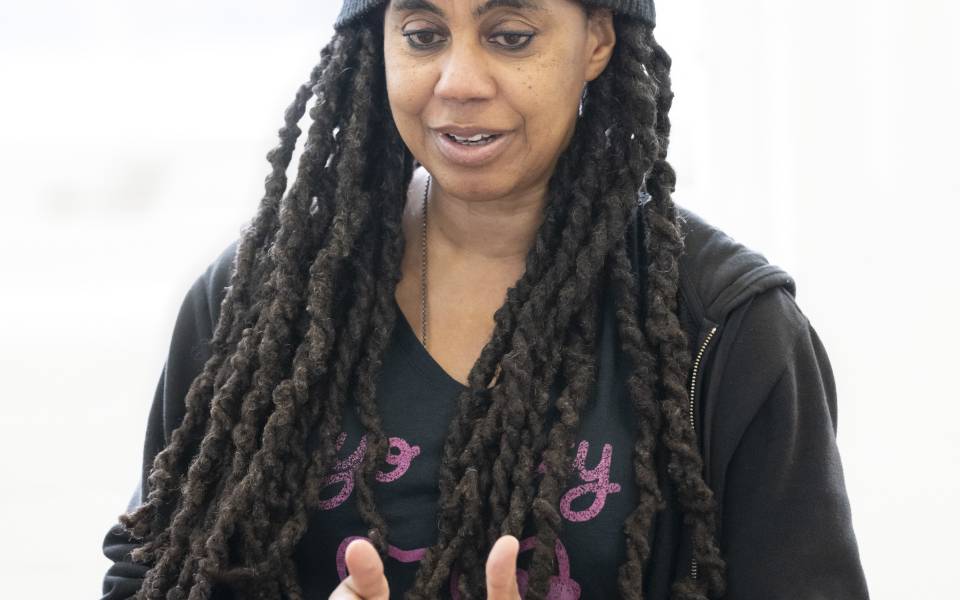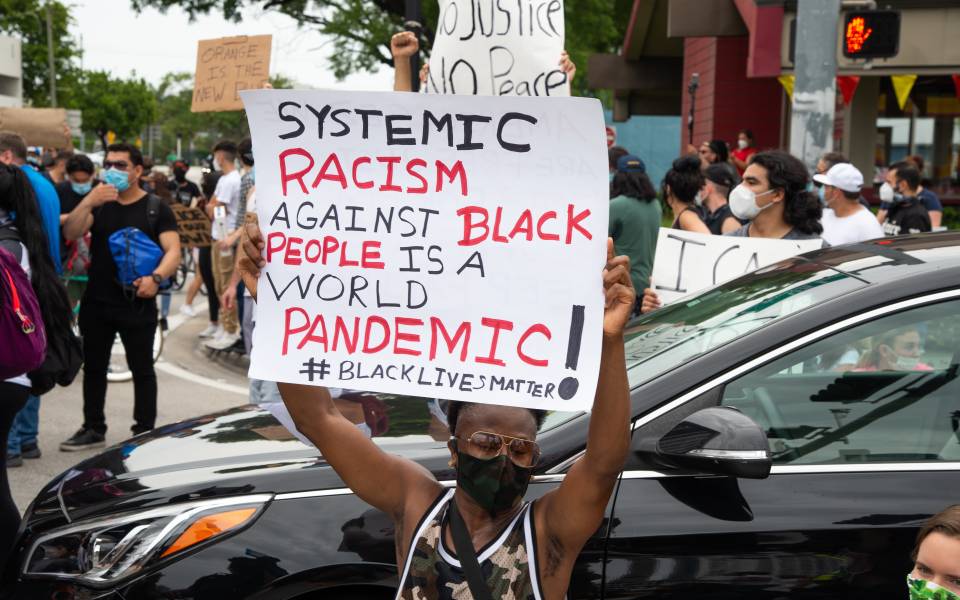
A Very American Story?
Olivette Otele
White Noise challenges our assumptions about the legacies of colonial enslavement. It explores the sources of anxiety in the characters’ relationships, as the spectre of enslavement plunges them into an experiment that will change their understanding of racial justice for ever. Resolutely contemporary, the play nonetheless takes us on a historical journey that forces the audience to re-evaluate the way they look at their lives in culturally diverse societies.
This is, at first glance, an American story. Yet the characters’ journey resonates with Britons from all backgrounds living in cities with links to slavery. The story could be set in London, Bristol or Liverpool. White Noise is about how colonial enslavement shaped societies – including in Britain – and the many ways we find to navigate those legacies.

'It's One of the Most Radical Plays I've Ever Written'
Bim Adewunmi speaks to Suzan-Lori Parks, writer of White Noise
The origins of White Noise came from Suzan-Lori Parks herself. Her 2014 play, Father Comes Home from the Wars (Parts 1, 2 and 3), set in the 1860s during the American Civil War , is about an enslaved Black man, Hero, caught up in the mess of a very…
More →Britain’s role in transatlantic enslavement is a story of men and women who invested in a trade based on the work of African captives. The story officially started with two sea captains, John Lok and William Towerson, who brought enslaved Africans to England to parade them before their fellow countrymen between 1555 and 1557. But it is John Hawkins who managed to get the approval and financial support of the monarchy. He acquired his human cargo in 1562. By 1569, he had made four voyages across the Atlantic and had managed to secure the financial support of powerful investors, including Queen Elizabeth I.
The so-called ‘Africa trade’ was so lucrative that the Company of Royal Adventurers of England Trading with Africa was set up in 1660 by King Charles II and his brother James, the Duke of York (later King James II). It became the Royal Africa Company and had the monopoly on the ‘Africa trade’ until 1698, when, having petitioned and lobbied Parliament, merchants from various cities finally had their own opportunity to engage in the plantation economy. The end of the monopoly led to an increase in the number of African captives forcibly taken across the Atlantic. It also resulted in a thriving plantation economy, based on the work and exploitation of black bodies. Transatlantic enslavement set the pace for practices of plantation management based on coercion, subjugation and violence against people of African descent. The hierarchy born in those settings, coupled with economic success, led Britons and other Europeans to believe that there was such a thing as racial superiority.
Meanwhile, those who abhorred the trade in human beings continued to campaign against it. In 1807, Britain abolished the slave trade, but it took several decades of campaigning for slavery itself to come to an end in 1833. Plantation owners and slave traders fiercely lobbied Parliament, and through the Compensation Act of 1837, they received financial compensation for the loss of their so-called property in the Caribbean, Mauritius and Cape of Good Hope. For nearly three centuries, Britain had transported over three million enslaved Africans. When this ended, slaveowners received compensation, while freed enslaved people did not receive the much-needed financial support to start building their lives after centuries of subjugation. The slave trade and slavery had come to an end, but mentalities had not changed.
The legacies of that past are embedded in Britain’s socio-economic and cultural landscapes. The narrative which presented enslavement as a victorious story of entrepreneurial sailors fell into partial amnesia, whereby only the history of abolition – not the previous centuries of enslavement – was taught throughout the 20th century.

To Be Black and Human is Not a Contradiction
Kojo Koram
The famous Martinican psychiatrist and philosopher Frantz Fanon once argued that “The Negro is not. Any more than the white man.” In making such a counter-intuitive declaration, Fanon was one of the first to publicly recognise that the racial…
More →Alongside this story of victory and conquest was the question of racial discrimination. Racism, it was argued, had nothing to do with slavery and everything to do with people of African descent’s inability to adapt and thrive. Some even suggested that it had a lot to do with people of African descent’s intellectual abilities. Although illegal, discrimination and overt acts of racism have continued to exist throughout the 20th century and to present day, even after the worldwide show of solidarity that followed the killing of African-American George Floyd in May 2020. The legacies of Europe and America’s pasts are complex and long-lasting. Police brutality denounced by many continues to be a reality for people of African descent in New York, Paris and London. Interracial relationships like those in the play – whether friendships or marriages – are affected by those legacies in various ways.
White Noise powerfully delves into what has been transmitted to us and how we live with the cards we have been dealt. It pauses on the way various characters live with or react to intergenerational trauma, on transmitted skills and survival mechanisms, but also on how internalised hatred shapes not only the protagonists’ outlooks on life but also their relationships. One of the most powerful moments of the play is a conversation between Dawn, a woman of European descent, and her African-American friend Misha:
DAWN: I hate being woke. I hate it. I just want to go back to being asleep. I just wanna/
MISHA: /Go back to the olden days. Back when everybody knew their place. Women. POCs.
DAWN: I didn’t mean it that way.
MISHA: No sweat.
Bittersweet, disturbing and powerfully engaging, White Noise could just as easily be a British story as American, pushing us to the limits of acceptance of the past and demanding us to consider alternative ways of surviving modern-day pressures. It looks at the mental health cost of our collective and individual survival journeys and shows us how we are all, to some extent, still enslaved by a brutal colonial past. That history has made us, and yet the past keeps reinventing itself and producing sharper tools to perpetuate subjugation in our daily lives.
Professor Olivette Otele, September 2021
Olivette Otele PhD, FRHistS is a Professor of History of Slavery and Memory of enslavement at the University of Bristol.
This article was originally published in the production‘s programme.
Photo by Johan Persson.
